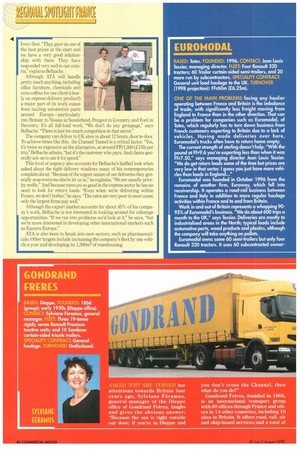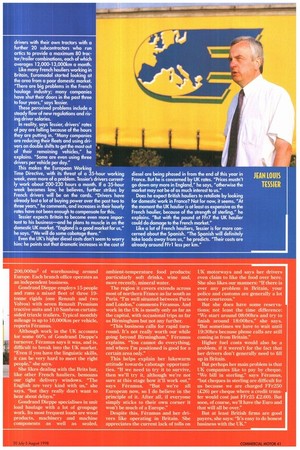GONDRAND FRERES
Page 42

Page 43

If you've noticed an error in this article please click here to report it so we can fix it.
BASED: Dieppe. FOUNDED: 1866 (group); early 1930s (Dieppe office). CONTACT: Sylviane Feramus, general manager. FLEET: Three 19-tonne rigids; seven Renault Premium tractive units; and 10 Sambron curtain-sided triaxle trailers. SPECIAUTY CONTRACT: General haulage. TURNOVER: Undisclosed. AsicED WHY SHE TURNED her attentions towards Britain four years ago, Sylviane Feramus, general manager of the Dieppe office of Gondrand Freres, laughs and gives the obvious answer: "Because the sea is right outside our door; if you're in Dieppe and you don't cross the Channel, then what do you do?"
Gondrand Freres, founded in 1866, is an international transport group with 80 offices through France and others in 14 other countries, including 10 sites in Britain. It offers road, rail, air and ship-based services and a total of 200,000m2 of warehousing around Europe. Each branch office operates as an independent business.
Gondrand Dieppe employs 15 people and runs a mixed fleet of three 19tonne tigids (one Renault and two Volvos) with seven Renault Premium tractive units and 10 Sambron curtainsided triaxle trailers. Typical monthly mileage is up to 10,000km per vehicle, reports Ferantus.
Although work in the UK accounts for some 60% of Gondrand Dieppe's turnover, Feramus says it was, and is, difficult to break into the UK market. "Even if you have the linguistic skills, it can be very hard to meet the right people," she says.
She likes dealing with the Brits but, like other French hauliers, bemoans our tight delivery windows. "The English are very kind with us," she says, "but they really don't want to hear about delays."
Gondrand Dieppe specialises in unit load haulage with a lot of groupage work. Its most frequent loads are wood products, machinery and machine components as well as sealed, ambient-temperature food products; particularly soft drinks, wine and, more recently, mineral water.
The region it covers extends across most of northern France as far south as Paris. "I'm well situated between Paris and London,' comments Feramus. And work in the UK is mostly only as far as the capital, with occasional trips as far as Birmingham but not any further.
"This business calls for rapid turnround. It's not really worth our while going beyond Birmingham," Feramus explains. "You cannot do everything, and where I'm positioned is good for a certain area only."
This helps explain her lukewarm attitude towards cabotage opportunities. "If we need to try it to survive, then we'll try it, although we're not sure at this stage how it'll work out," says Feramus. "But we're all European now, so I do believe in the principle of it. After all, if everyone simply sticks to their own corner it won't be much of a Europe."
Despite this, Feramus and her drivers like operating in Britain. She appreciates the current lack of tolls on LUC motorways and says her drivers even claim to like the food over here. She also likes our manners: "If there is ever any problem in Britain, your police and customs are generally a lot more courteous."
But she does have some reservations; not least the time difference: "We start around 08:00hrs and try to finish around 18:00hrs," she says. "But sometimes we have to wait until 19:30hrs because phone calls are still coming in from Britain."
Higher fuel costs would also be a problem, if it weren't for the fact that her drivers don't generally need to fill up in Britain.
But perhaps her main problem is that UK companies like to pay by cheque. "We bill in sterling," says Feramus, "but cheques in sterling are difficult for us because we are charged FFr250 (£26) per cheque where a credit transfer would cost just FFr25 £2.60). But soon, of course, we'll have the Euro and that will all he over."
But at least British firms are good payers, she says: "It's easy to do honest business with the UK."












































































































